Is your eCommerce website secure enough to withstand cyber threats? Don’t fall victim to cyber-attacks on your online store. Keep reading this post, and follow these 10 crucial steps for maximum protection, regulatory compliance, and customer trust.
Table of Contents
Introduction
In today’s digital era, the security of your eCommerce website is crucial to safeguard both your business and customers from cyber threats. Cyber attacks on online stores can lead to significant financial losses and a damaged reputation.
By implementing 10 essential measures, you can ensure maximum protection for your eCommerce platform against these growing cyber risks. In this blog post, we will explore various types of common cybersecurity threats in the e-commerce landscape and provide actionable insights on strengthening your website’s security posture.
Key Takeaways
- Choose a secure eCommerce platform that prioritizes online store security.
- Keep software updated regularly to address vulnerabilities and prevent potential security breaches.
- Use HTTPS and SSL certificates to encrypt data transferred between the website and customers, preventing identity theft or financial loss.
- Implement strong password policies, regularly back up website data, and educate employees and customers about cybersecurity risks to protect against common cyber threats such as payment fraud, phishing attacks, malware, and ransomware, and distributed denial of service (DDoS) attacks.
Also Read: Best Practices for eCommerce Fraud Prevention: A Guide for Online Sellers.
Understanding Cyber Threats For ECommerce Websites
Cyber attacks on e-commerce websites are becoming more frequent and sophisticated, including payment fraud, phishing attacks, malware, ransomware, and distributed denial of service (DDoS) attacks.
Common Types Of Cyber Attacks On E-commerce Websites
E-commerce websites, being lucrative targets for cybercriminals, are often subjected to various cyber attacks. Online sellers should be aware of these common threats to protect their businesses and customers effectively:
- Payment Fraud: Cybercriminals use stolen credit card information or fraudulent transactions to make illegal purchases on your website.
- Phishing Attacks: These involve sending emails that appear legitimate, tricking users into providing sensitive information or granting access to secure systems.
- Malware and Ransomware: Malicious software programs designed to infiltrate and damage computer systems, or hold them hostage in exchange for payment.
- Distributed Denial of Service (DDoS) Attacks: Overwhelming your website with traffic from multiple sources, causing it to become inaccessible for legitimate users.
- SQL Injection: Cybercriminals insert malicious code into your website’s database, potentially gaining unauthorized access to sensitive data.
- Cross-Site Scripting (XSS): Attackers inject malicious scripts into trusted websites, executing on the victims’ browsers when they visit the compromised site.
- Brute Force Attacks: Attempting numerous password combinations to gain unauthorized access to accounts or systems.
- Man-in-the-Middle (MITM) Attacks: Interception and manipulation of data transmitted between two parties without them knowing their communication is being monitored.
- Eavesdropping/ Sniffing Attacks: Cybercriminals monitor network traffic to intercept sensitive data.
- Session Hijacking: Attackers exploit vulnerabilities in web applications’ session management mechanisms to hijack active user sessions and gain unauthorized access.
Knowing these common cyber threats helps online sellers develop a robust cybersecurity strategy for their eCommerce websites.

The Impact Of Cyber Attacks On Businesses And Customers
Cyber attacks on eCommerce websites can have devastating consequences for both businesses and their customers. Hackers may attempt to steal sensitive customer data, including credit card information, names, addresses, or other personal details.
In addition to damaging your business’ reputation, cyber attacks can result in serious financial losses from disruptions in operations or theft of funds.
For small business owners, such incidents may even lead to bankruptcy.
Online sellers must prioritize cybersecurity measures and regularly update security protocols to prevent these negative impacts.
Types Of Cybersecurity Risks For ECommerce Websites
eCommerce websites are at risk of payment fraud, phishing attacks, malware, and ransomware, and distributed denial of service (DDoS) attacks which can severely impact businesses and their customers.

Payment Fraud
One of eCommerce websites’ most common cyber threats is payment fraud. Criminals use various methods to steal credit card information, such as hacking into the website or using malicious software.
This can result in significant financial losses for online sellers and their customers. To protect against payment fraud, it’s essential to implement security measures like two-factor authentication and data encryption to safeguard sensitive information from unauthorized access.
PCI compliance guidelines will provide a framework for ensuring your website meets proper industry standards for securely handling customer information.
Ecom Weaver
Phishing Attacks
One of the most common cybersecurity risks for eCommerce websites is phishing attacks. These are attempts by cybercriminals to trick customers into revealing their confidential information, such as credit card details, login credentials, and personal data through fake emails or messages.
Phishing attacks can cause severe damage to a business’s reputation if customer data falls into the wrong hands. Therefore, online store owners need to educate their employees and customers about how these fraudsters operate so they can be vigilant against suspicious emails with unusual requests for sensitive information.
Malware And Ransomware
Malware and ransomware are types of cyber attacks that can cause significant damage to eCommerce websites. Malware refers to malicious software designed to disrupt, damage, or gain unauthorized access to computer systems.
Ransomware is malware that encrypts valuable data on a website and demands payment in exchange for the decryption key.
To protect your eCommerce site from these threats, it’s essential to enforce strong security measures such as updating software regularly, using web application firewalls and antivirus software, and avoiding clicking suspicious emails or links.
Businesses should also create backups regularly to ensure they have copies of their data should an attack occur.
Distributed Denial Of Service (DDoS) Attacks
One cyber threat that online sellers should be aware of is the Distributed Denial of Service (DDoS) attack. This type of attack floods a website with traffic from multiple sources, overwhelming the server and causing it to crash or become unresponsive.
DDoS attacks can devastate eCommerce websites, including lost revenue, damaged reputation, and loss of customer trust. Attackers may sometimes use DDoS attacks to cover other security breaches, such as data theft or malware installation.
To safeguard against DDoS attacks, online store owners can employ web application firewalls and work with their hosting providers to implement additional security measures such as load balancing and traffic filtering techniques.
10 Essential Measures To Protect Your ECommerce Website
Implement strong password policies, regularly back up website data, and educate employees and customers about cybersecurity to prevent attacks on your eCommerce website.
Choose A Secure E-commerce Platform
One of the fundamental steps to safeguard your eCommerce website from cyber threats is choosing a secure e-commerce platform. Not all platforms offer robust security features, so it’s essential to research and choose one that prioritizes online store security.
For instance, Shopify is known for its high-level security features, such as automatic backups, SSL encryption for customer data, and PCI compliance.
Similarly, WooCommerce offers regular software updates to patch vulnerabilities on its platform.
Keep Software Updated And Patched
Keeping your software updated and patched is one crucial measure to safeguard your eCommerce website from cyber threats. Hackers often exploit vulnerabilities in outdated software, making it easier to gain unauthorized access.
Regular updates help fix these vulnerabilities, preventing potential security breaches.
Many online sellers overlook the importance of updating their software regularly, assuming that their website will be protected with just a one-time installation. However, this approach can make the site vulnerable to new risks and attacks.
Use HTTPS And SSL Certificates
Using HTTPS and SSL certificates is essential to safeguard your eCommerce website from cyber threats. HTTPS (Hypertext Transfer Protocol Secure) encrypts the data transferred over the internet between your website and customers.
SSL (Secure Sockets Layer) provides a layer of encryption, ensuring that sensitive information such as credit card details remains secure.
To implement HTTPS on your eCommerce website, you will need an SSL certificate issued by a trusted certificate authority. You can purchase these certificates from hosting providers or third-party vendors.
Once installed, an SSL certification will display a padlock icon beside the URL in the browser address bar signifying that your site is secure for transactions.
Taking these measures helps ensure customer trust and safety while also protecting you against potential legal liability from breaches of sensitive customer data saved on non-secure websites.
Use Web Application Firewalls
Web application firewalls (WAFs) are a crucial layer of security for your eCommerce website. They monitor and filter incoming traffic to detect and block malicious requests before reaching your web server, protecting against common attacks like SQL injection or cross-site scripting.
There are several types of WAFs available, both hardware-based and cloud-based. Some popular ones include CloudFlare, Sucuri, and Akamai. A quality WAF will also allow customization to help ensure specific vulnerabilities are blocked from attack attempts.
Incorporating a web application firewall ensures that only safe traffic is allowed onto the site while any harmful requests get filtered out by the firewall.
Regularly Backup Your Website Data
Creating backups of your website data is an essential security measure to safeguard your eCommerce website from cyber threats. Regular backups can help restore your site in case of a cyber-attack or accidental deletion, ensuring minimal downtime and loss of information.
Ideally, it would be best to create daily or weekly backups, depending on the frequency of updates on your website.
It’s important to note that backing up your data means saving it securely offsite and not on the same server as your primary website. This ensures that if something happens to the server hosting your leading site, you will still have access to all critical information required for the functioning of your online store.
Implement Strong Password Policies
Implementing strong password policies on your eCommerce website is important as part of the overall security strategy. Passwords are like keys granting access to sensitive data, so setting up effective regulations is crucial.
Your password policy should require complex passwords with a mix of letters, numbers, and special characters to prevent brute-force attacks. Discourage users from using easy-to-guess passwords such as their names or birthdays by enforcing minimum length requirements and regular changes.
Also, consider implementing two-factor authentication that requires a second form of identification beyond just a password.
According to facts, educating employees about cybersecurity is another way to maintain strong password protection on your eCommerce site.
By following these guidelines and implementing robust measures, online sellers will have peace of mind knowing their customer information is safe from cyber threats while shopping on their website.
Educate Your Employees And Customers About Cybersecurity
Educating your employees and customers about cybersecurity is essential as they are critical components in safeguarding your e-commerce website. Employees should be trained on safe browsing habits, password hygiene, identifying phishing scams, and reporting suspicious activity immediately.
Similarly, customers should be encouraged to use strong passwords and avoid sharing their login credentials with anyone.
Remember that cyber threats can target anyone at any time.
Monitor Your Website For Suspicious Activity
Regularly monitoring your website for suspicious activity is crucial in safeguarding your eCommerce platform from cyber threats. Hackers can use various techniques to gain access to sensitive information, and detecting their activity early can prevent significant damage.
It would be best if you were always alert for unusual traffic spikes, multiple login attempts, or any unknown transactions.
Another way to monitor your site is by installing analytical tools like Google Analytics that examine user behavior patterns regularly. This helps you track standard activities and investigate any unusual actions, such as changes in page views, bounce rates, and click-throughs.
By watching for suspicious activity on your eCommerce website, you’ll be better equipped with the necessary measures to protect it against cyber threats effectively.
Conduct Regular Security Audits
Regular security audits are crucial for eCommerce websites to identify and mitigate vulnerabilities that could lead to a cyber attack. By conducting security audits, online sellers can detect any potential loopholes in their website’s security measures and promptly take corrective action.
During these audits, thoroughly analyzing the website’s database, applications, server infrastructure, and network configuration is essential. This includes testing for software vulnerabilities that hackers could exploit, reviewing user access privileges, ensuring regulatory compliance with payment card industry standards (PCI DSS), and verifying data backups.
Ensure Regulatory Compliance
Regulatory compliance is a critical aspect of safeguarding eCommerce websites from cyber threats. Online stores must adhere to data protection and privacy regulations, such as the General Data Protection Regulation (GDPR) and the California Consumer Privacy Act (CCPA).
Failure to comply with these laws can lead to hefty fines and irreparable damage to your brand’s reputation.
To ensure regulatory compliance, online sellers should keep abreast of the latest rules and regulations related to their specific industry or location. Conducting regular audits, creating strict data handling and storage policies, and obtaining necessary certifications like PCI DSS compliance are all important measures that improve website security while maintaining regulatory guidelines laid down by authorities.

Importance Of Choosing The Right Hosting Service
The hosting service you choose can play a significant role in the security of your eCommerce website, as they are responsible for keeping your site running and protecting it from potential cyber threats.
How Hosting Providers Can Impact Your Website’s Security
Choosing the right hosting provider is one of the crucial steps in safeguarding your eCommerce website from cyber threats. A reliable hosting service can provide a secure environment for your online store, while an unreliable one can make your website vulnerable to attacks.
The hosting provider’s security measures and policies significantly protect your site against hacking attempts and data breaches.
Additionally, the type of hosting service you choose can also impact your eCommerce website’s security. Shared hosting may be cost-effective but has inherent vulnerabilities as multiple websites share resources on the same server.
On the other hand, dedicated or virtual private servers (VPS) give you full control over security measures and minimize risks associated with shared environments.
Another aspect worth considering is how often backups are performed by the chosen provider – this will ensure that all vital information on payment gateways remain safe if anything goes wrong during transactions like lost order history or credit card details due to unsecured environments where they may have been misused after being intercepted or downloaded unlawfully.
Factors To Consider When Choosing A Hosting Service
Choosing the right hosting service is crucial for eCommerce websites. Here are the factors to consider when choosing a hosting service:
- Security measures: Look for a hosting provider that offers advanced security measures such as firewalls and DDoS protection.
- Reliability: You want a hosting service with good uptime guarantees and can handle traffic spikes during peak periods.
- Scalability: Choose a hosting provider that can scale with your business’s needs, allowing you to upgrade your plan as you grow.
- Support: Ensure that your hosting provider offers 24/7 support, whether through live chat or phone, to address any issues quickly.
- Speed: A fast-loading website is crucial for an eCommerce website, so choose a provider with fast servers and CDN options.
- Cost: Compare different hosting providers’ pricing plans and look for one that fits within your budget while still offering the necessary features.
By considering these factors when choosing a hosting service, you can ensure that your eCommerce site has optimal security, reliability, and performance.
PCI Compliance And Secure Online Checkout
Online store owners should understand the importance of PCI compliance to ensure secure online checkout, implement two-factor authentication, and follow best practices such as not saving credit card data to prevent a breach in sensitive information.
Understanding PCI Compliance And Its Importance For E-commerce Websites
PCI compliance is a set of standards created by major credit card companies to ensure that businesses handling sensitive information, such as credit card details, are doing so securely.
E-commerce websites need to be PCI compliant because they could face hefty fines and legal repercussions if they aren’t.
To become PCI compliant, online sellers need to meet certain requirements, such as using firewalls and encryption methods when handling sensitive data. Another crucial aspect of being PCI compliant is secure online checkout.
This can be achieved through two-factor authentication, where the customer needs to enter an additional code sent via text or email before completing their transaction.
Overall, becoming PCI compliant helps e-commerce websites prevent cyber-attacks and ensures customer safety, leading to a better business reputation and increased sales revenue.

Best Practices For Secure Online Checkout
Secure checkout is crucial for online sellers to safeguard their eCommerce websites from cyber threats. Follow these best practices for a secure online checkout:
- Use SSL certificates and HTTPS encryption to protect sensitive information like credit card details.
- Implement two-factor authentication, requiring users to enter a secondary code before completing a transaction.
- Do not store credit card information on your website to prevent data breaches.
- Ensure PCI compliance by following industry standards and regulations for payment processing.
- Keep your software up-to-date with the latest security patches and updates.
- Use web application firewalls to protect against DDoS and other attacks.
- Educate your customers on how to identify fraudulent transactions and suspicious activity.
- Monitor your website regularly for unusual activity or unauthorized access.
- Conduct regular security audits to identify vulnerabilities and take corrective action promptly.
- Work with trusted third-party providers for payment processing and other critical services.
By following these best practices, online sellers can ensure a secure checkout process for their customers, protecting their business and customer data from potential security threats.
How To Implement Two-factor Authentication
This is perhaps the best way to Protect Your eCommerce Website and your customer’s accounts. Two-factor authentication (2FA) is a powerful tool that adds an extra layer of security to online accounts, making it more difficult for hackers to gain access.
For example, when customers log into their account on your website, they would need to enter their password and then be prompted to enter a unique code generated by the 2FA method they have chosen.
Online sellers should encourage customers to enable 2FA for their accounts and consider implementing it themselves for administrative tasks.

Here’s a step-by-step guide on how you can implement 2FA:
Step 1: Understand the Types of 2FA
First, it’s important to understand the different types of 2FA methods available:
- Something You Know: This could be a password, answers to “secret questions,” or a PIN.
- Something You Have: This could be an email account, a smartphone with a specific software token, or a hardware token.
- Something You Are: This includes biometrics like fingerprints, retina scans, or voice recognition.
Step 2: Choose a 2FA Solution
There are numerous 2FA solutions available on the market. Some popular ones include:
1. Google Authenticator
Google Authenticator is a free and reliable 2FA application for Android and iOS devices. This tool adds an extra layer of security by generating unique verification codes that can be used along with your regular login credentials. Google Authenticator is user-friendly, and the generated codes do not require a data connection, making it accessible in various situations. Additionally, the app works with numerous providers and accounts, offering you the flexibility to secure different platforms.
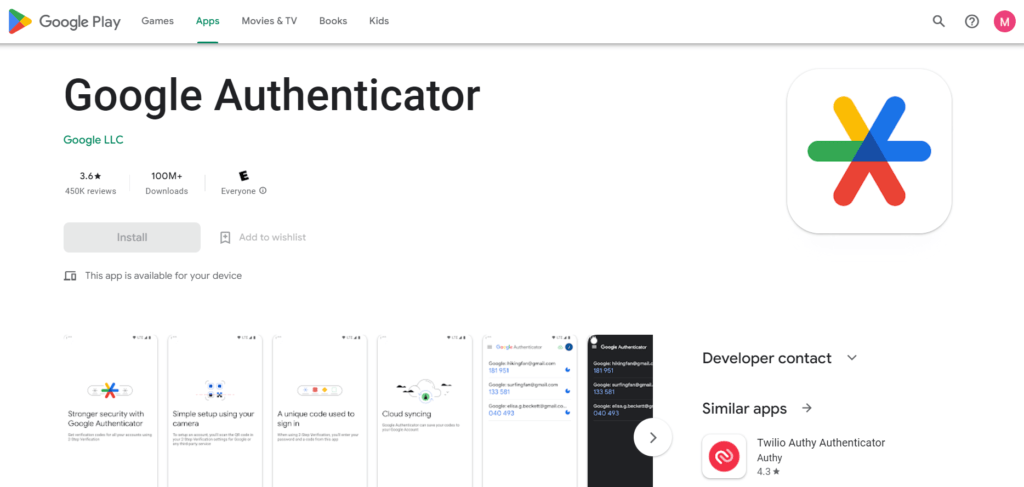
2. Authy
A potent alternative to Google Authenticator is Authy. Authy offers the standard features of a 2FA app but raises the bar with its ability to create encrypted backups. This means even if you lose your device, you can still access your codes using another device. Authy also allows multi-device synchronization. So, if you switch between a tablet, smartphone, and computer, Authy has you covered. This feature can be especially useful for online sellers managing their business across multiple devices.
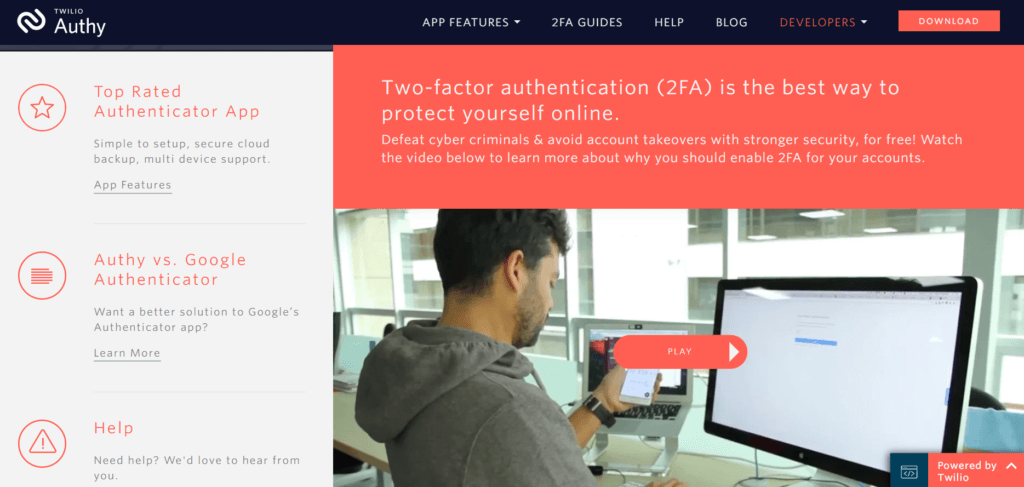
3. Duo Security
Duo Security provides an intuitive 2FA experience and is trusted by many organizations worldwide. Its standout feature is the ability to send push notifications to your phone for authentication. Instead of manually inputting a code, you only need to tap “Approve” on the received notification to validate your identity and gain access. This quick and convenient process can save precious time, allowing you to focus more on managing your online store.
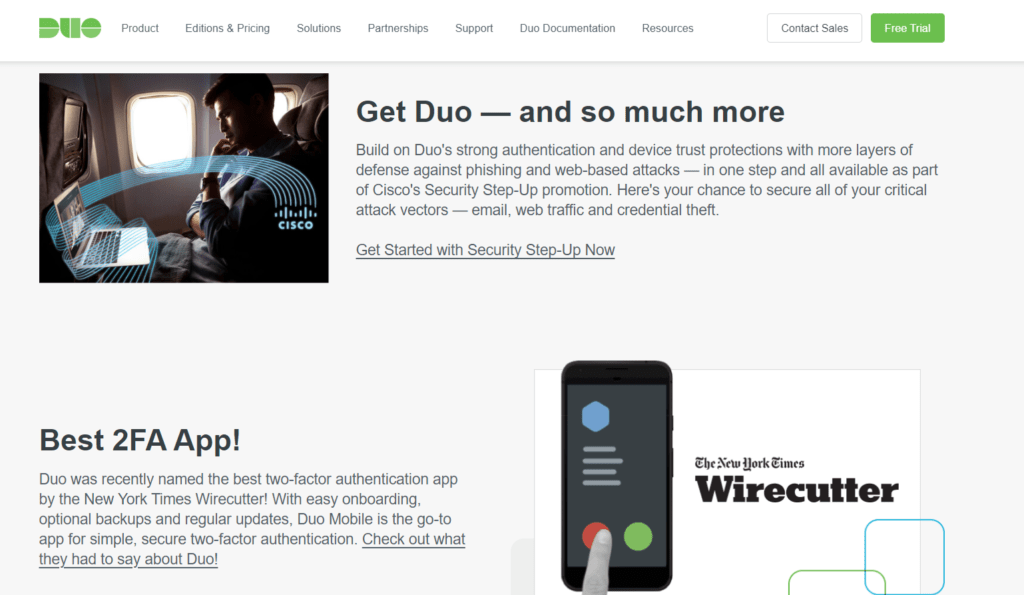
4. Microsoft Authenticator
The Microsoft Authenticator app also provides a seamless user experience for 2FA. It offers backup capabilities, ensuring you can still access your accounts even when changing devices. What sets Microsoft Authenticator apart is its support for wearable devices. You can use an Apple Watch or Samsung Gear device to approve sign-in notifications, making it easier to manage authentication requests even when moving.
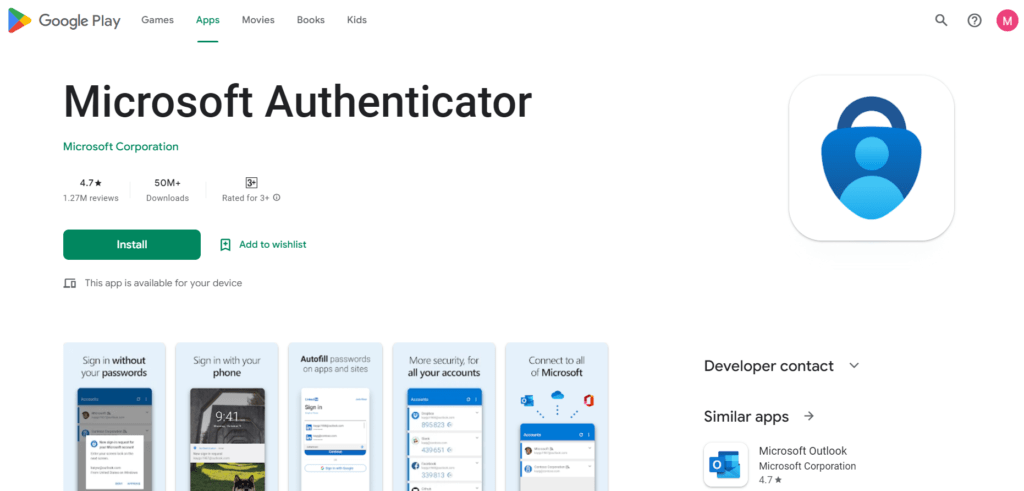
5. Yubico
If you’re looking for a hardware-based 2FA solution, Yubico might be your choice. Yubico offers a USB security key known as YubiKey. The physicality of YubiKey can deter phishing attacks as it requires the physical key to generate the 2FA code. This can be a valuable solution for online sellers who handle sensitive customer data and want to add tangible security.
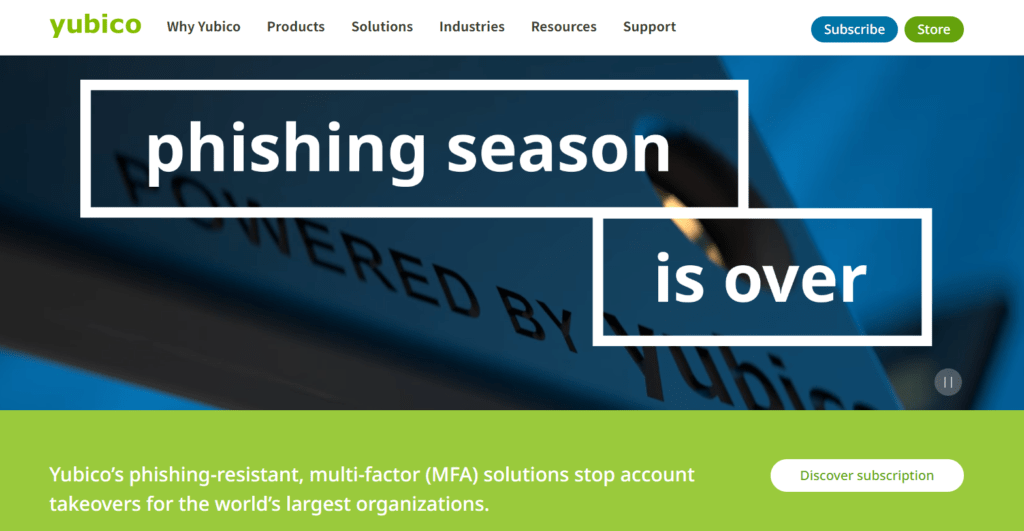
Step 3: Enable 2FA in Your System
Each 2FA solution will have its steps for enabling 2FA on your system. Here’s a general approach:
- For Google Authenticator
- Download the Google Authenticator app on your device.
- Find the option for setting up 2FA in your application’s security settings and select Google Authenticator.
- You’ll see a QR code on your screen. Scan this code with the Google Authenticator app.
- The app will now generate codes for you to use when you log in.
- For Authy
- Download the Authy app on your device.
- In your application’s security settings, find the option for setting up 2FA and select Authy.
- Enter your phone number and email address in Authy, then verify them.
- Authy will now generate codes for you to use when you log in.
Step 4: Educate Your Customers
Educate your customers about the importance of 2FA and how to enable it. This can be done through emails, pop-up messages, or even during sign-up.
Step 5: Encourage Regular Use
Encourage your customers to use 2FA regularly and remind them of its benefits. You might also consider offering incentives to those who use 2FA.
Remember, security is paramount in the online world. Implementing 2FA can help protect your customers’ accounts from unauthorized access and enhance the overall security of your online platform.
Conclusion And Final Thoughts – Safeguard Your Online Store Today
Safeguarding your eCommerce website from cyber threats should be a top priority for all online sellers. Taking the necessary measures, such as using secure e-commerce platforms, implementing SSL certificates and HTTPS, regularly updating software and plugins, conducting security audits, and educating employees and customers about cybersecurity, can significantly reduce the risk of a cyber attack.
Remember that payment fraud, phishing attacks, malware, and ransomware are real cybersecurity risks that can severely affect businesses’ financial health and reputation in the marketplace.
By regularly backing up your website’s data, enforcing strong password policies, and monitoring for suspicious activity on your website constantly, you can effectively shield yourself from these common types of cyber attacks.
Security should remain an ongoing effort because new cyber threats emerge daily.
Frequently Asked Questions
1. What is E-commerce Security?
E-commerce security refers to the principles, measures, and protections that secure your e-commerce site from cyber threats such as cyber-attacks, hacks, and breaches. These security measures protect your online transactions and customers’ sensitive data.
2. Why is Security Important for My E-commerce Website?
Security is paramount for any e-commerce website because it deals with sensitive customer data, including credit card information, social security numbers, and personal addresses. Ensuring top-notch security helps protect your site from being hacked, builds customer trust, and ensures the smooth operation of your online business.
3. What are some common cyber threats to eCommerce websites, and how can I protect against them?
Cyber threats to eCommerce websites include hacking, malware infections, phishing scams, and DDoS attacks. To protect against these threats, it is important to implement secure server configurations, use strong passwords and two-factor authentication for all accounts, regularly update software and security patches, and conduct regular security audits.
4. How can SSL certificates help secure my eCommerce website?
SSL (Secure Sockets Layer) certificates encrypt data transmitted between a user’s browser and your website’s server. This helps prevent hackers from intercepting sensitive information such as credit card details or personal identification information.
5. What should I do if I suspect a security breach on my eCommerce website?
If you suspect a security breach has occurred on your eCommerce website, it is important to act quickly to minimize potential damages or losses. This may involve temporarily shutting down the site while you investigate the issue, notifying customers of any potential risks or compromised data, updating credentials and access controls immediately, etc.
6. What measures should I take to ensure customer financial safety when processing payments through my eCommerce site?
To ensure customer financial safety when processing payments through an e-commerce site – one should utilize industry standard payment methods along with advanced fraud detection mechanisms that screen each transaction in real-time for signs indicating possible fraudulent activity before completion to limit chargebacks & reduce overall risk from happening over a fine period.
PayPal Accounts and Braintree Payment Gateway are a few other options available depending upon budget constraints & clientele preferences.
7. How Can I Protect My E-commerce Site?
There are several ways to protect your e-commerce site. Some measures include:
- Implementing SSL certificates for secure data transfer.
- Regularly updating your e-commerce platform and security plugins to patch security vulnerabilities.
- Complying with Payment Card Industry Data Security Standards (PCI DSS) for secure payment processing.
- Implementing multi-layer security measures such as firewalls, intrusion detection systems, and data encryption.
- Regularly backing up your website data to recover in case of a breach.
8. What is a Cyber Attack, and How Can It Affect My E-commerce Business?
A cyber attack is an attempt by hackers to damage, disrupt, or gain unauthorized access to your e-commerce site’s computer network or system. A successful cyber attack can lead to data breaches, loss of customer trust, regulatory fines, and, ultimately, loss of business.
9. How Can I Ensure My E-commerce Website is Protected Against Future Threats?
To protect your eCommerce website against future threats, regularly update your website’s security measures. Regularly monitor your site for any suspicious activity, use security tools offered by cybersecurity experts, and educate your team about security best practices. It is also important to keep up-to-date with new security standards and implement them as needed.
10. Are There Security Standards That My E-commerce Site Should Adhere To?
Yes, there are several security standards that your e-commerce site should adhere to, like the Payment Card Industry Data Security Standard (PCI DSS) for handling card payments and ISO/IEC 27001:2013 for information security management systems. Compliance with these standards ensures your site meets globally recognized security protocols and provides an additional layer of security.
11. Can My E-commerce Site Be 100% Secure From All Security Threats?
While making any website 100% secure is challenging, prioritizing website security and using robust security practices can significantly reduce the risk of security threats. This includes having a secure e-commerce platform, implementing multiple security measures, regularly updating your site’s security, and working with security experts to keep your site as secure as possible.







